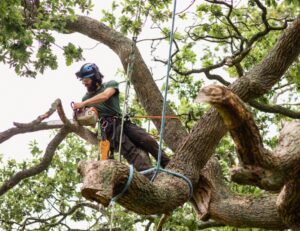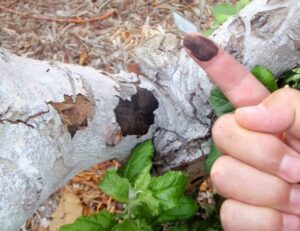Citrus trees are a wonderful addition to Phoenix landscapes, offering both beauty and a delicious harvest. At Trees for Needs, we understand their value and are here to provide expert care. In this guide, we’ll explore common issues that citrus trees face and offer practical care tips to ensure your citrus trees thrive in Phoenix’s arid climate.
Common Citrus Problems and Expert Solutions
Dealing with Fruitless Trees
Problem: Your citrus tree isn’t producing fruit as expected.
Solution: Our experts will assess the tree’s health and adjust fertilization and pruning techniques to encourage fruiting.
Tip: Contact our Certified Arborists for a thorough assessment. They can recommend proper fertilization and pruning strategies based on your tree’s unique needs.
Nailing the Fertilizing Timing
Problem: Figuring out when to fertilize can be tricky.
Solution: Learn when and how to apply fertilizers for healthy growth and fruitful results. Begin by understanding the basic principles of citrus tree nutrition. Citrus trees typically require nitrogen, phosphorus, and potassium. Research reputable gardening websites, local agricultural extension offices, and horticultural societies for detailed guides on fertilizing citrus trees. Consider attending workshops or webinars focused on Phoenix-specific citrus care, where experienced gardeners and experts share insights into fertilization practices. Engage with online gardening forums to learn from the experiences of fellow citrus tree enthusiasts in your region. Experiment with small amounts of balanced fertilizer, starting in early spring before new growth emerges.
Tip: Consult our arborists for a customized fertilization schedule. They can guide you on the right type of fertilizer and the best times to apply it.
Pruning Like a Pro
Problem: Improper pruning can hinder growth and fruit production.
Solution: Our tips on pruning for shape and removing dead wood will keep your tree thriving.
Tip: Reach out to us for professional pruning guidance. Our arborists can demonstrate proper pruning techniques and advise on the optimal timing.
- Reviving Yellow Leaves: Problem: Yellow leaves can signal nutrient deficiencies or pests. Solution: Identify causes and remedies, from adjusting soil pH to managing pests. Tip: Let our experts diagnose the issue. They can conduct soil tests and recommend soil amendments or pest management strategies.
- Mastering Watering Techniques: Problem: Over or underwatering can stress trees and hinder fruit development. Solution: Learn the right way to water for your citrus trees’ specific needs. Tip: Our arborists can assess your soil and tree health to determine the ideal watering schedule. They can also guide you on proper irrigation methods.
Proactive Citrus Tree Care
Regular Check-ups
Action: Schedule routine inspections with our Certified Arborists for early issue detection.
Tip: Connect with us to set up regular inspections. Our experts can spot problems in their early stages and provide timely solutions.
Mulching for Moisture
Action: Discover the benefits of mulching to keep soil moist and temperatures steady.
Tip: Consult our arborists on mulching techniques and materials. They can guide you on the right mulch type and application method.
Pest Prevention and Management
Action: Get to know common citrus pests and how to prevent and treat them effectively.
Citrus trees in Phoenix are susceptible to a range of pests that can compromise their health and fruit production. Here are some common citrus pests to watch out for and proactive measures you can take to prevent and manage them:
- Citrus Leafminer: These small moths lay eggs on young leaves, and the larvae create winding tunnels within the leaves as they feed. To prevent infestations, apply horticultural oils or neem oil to foliage during the egg-laying period. Prune and destroy affected leaves to minimize larvae spread.
- Aphids: Aphids are tiny insects that feed on sap, causing leaf curling and distortion. Regularly inspect your tree’s new growth for clusters of aphids. Hose them off with a strong stream of water or introduce beneficial insects like ladybugs to control their population.
- Scale Insects: Scale insects appear as small, round bumps on branches and leaves. They feed on sap, weakening the tree. Use horticultural oil to smother them or physically remove them with a soft brush dipped in soapy water.
- Whiteflies: These tiny insects feed on the undersides of leaves, causing yellowing and stunted growth. Yellow sticky traps can help control their population. Neem oil can also be effective in reducing their numbers.
- Ants: Ants often protect pests like aphids from predators in exchange for honeydew. Control ant populations by keeping the area around the tree clean and applying ant baits away from the tree.
Regularly inspect your citrus tree’s leaves, stems, and fruit for signs of pests. Early detection is key to effective management. If you notice an infestation, consider contacting our Certified Arborists at Trees for Needs. They can provide tailored advice and recommend safe and effective treatments to protect your citrus tree from pests. Call (602) 405-1788 to consult our experts and ensure your tree’s health.
Balancing Sun Exposure
Action: Understand the importance of sunlight while protecting your trees from intense afternoon heat. To achieve this equilibrium, seek guidance from our arborists on proper tree placement. They can advise on strategic locations and shading techniques, ensuring your trees receive optimal morning sun while being shielded from the harsh afternoon rays. Implementing shade cloth during peak heat, mulching, thoughtful pruning, regular watering, and monitoring soil temperature further contribute to maintaining the right sun-soil balance.
Find Certified Arborists in Phoenix, AZ with Trees for Needs
Caring for your citrus trees in Phoenix is all about a tailored approach. With Trees for Needs’ Certified Arborists, you have a knowledgeable partner to tackle common problems and apply effective care tactics. From troubleshooting issues to offering hands-on advice, our expertise ensures your citrus trees flourish, adding beauty and tasty fruit to your Phoenix landscape. Call us at (602) 405-1788 to elevate your citrus tree care game in Phoenix, AZ.



